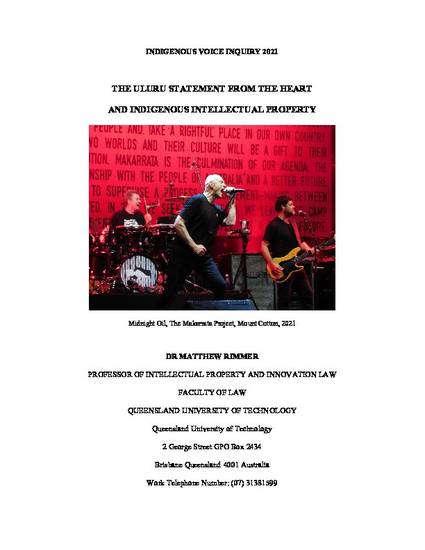
Other
The Uluru Statement from the Heart and Indigenous intellectual property: A Submission to the Indigenous Voice Inquiry
(2021)
Abstract
The Uluru Statement for the Heart recognizes the importance of culture and heritage to Australia’s First Nations: "We seek constitutional reforms to empower our people and take a rightful place in our own country. When we have power over our destiny our children will flourish. They will walk in two worlds and their culture will be a gift to their country." The proposals in respect to an Indigenous voice, truth-telling, and a treaty would perhaps be helpful in the development of Indigenous rights and Indigenous intellectual property. This submission discusses the ways in which the recognition of an Indigenous voice would assist policy-making and practice respect of Indigenous rights and Indigenous intellectual property.
In his book, Finding the Heart of the Nation, Thomas Mayor has explained that the establishment of an Indigenous Voice will improve policy-making in Australia:
"The establishment of a First Nations Voice enshrined in the Constitution is the priority reform – indeed it is now an urgent reform – because, unlike other racial or ethnic groups, law and policies are being made by governments specifically about us, without us, and too often to our detriment. A Voice is the first reform because it will start to address this political disempowerment, setting us on the path for the future reforms of Treaty and Truth."
There should be an Indigenous Voice to Parliament – not merely an Indigenous voice to Government. Once the model for an Indigenous voice has been settled, there should be a referendum. Enabling legislation for the Indigenous Voice should be passed after a referendum has been held in the next term of Parliament. The membership model for the National Voice must provide for a diverse and inclusive representation of Aboriginal and Torres Strait Islander peoples.
The establishment of an Indigenous Voice should be followed by a Treaty and a truth-telling process. The combination of a voice, treaty, and truth would be ideal – rather than merely the recognition of those concepts in isolation. Thomas Mayor has explained the need for an Indigenous Voice. He reflects:
"The Voice is the key step forward. Truth-telling alone does not produce solutions. We do. And the truth is justification for the solutions we seek and deserve. To use the truth to get meaningful, lasting treaties, and to affect the legislation and policies that have so fatally failed us, we must have a Collective Voice to the Federal Parliament in Canberra. Our Elders have called for a Voice for generations. We direly need representatives that we choose, who are accountable to us – not the parliament, a corporate sponsor or the media. The time has come for this proposal. We must not take “no” for an answer. The line has been drawn in the red sand at Uluru. "
There remain many outstanding issues of public policy in respect of Indigenous rights and Indigenous intellectual property. It is worth outlining a number of areas, worthy of further law reform and development. First, this submission notes that an Indigenous Voice would help give force to the UN Declaration on the Rights of Indigenous Peoples 2007. Second, the contribution observes that an Indigenous voice would improve policy-making in respect of copyright law, policy, and practice. Third, this submission suggests that an Indigenous Voice would help refine the right of resale for visual artists – including Indigenous artists. Fourth, this policy paper contends that an Indigenous Voice will help protect Indigenous consumers. Fifth, this submission contends that an Indigenous Voice will ensure that trade mark law and policy have a greater sensitivity to Indigenous iconography. Sixth, this paper argues that an Indigenous Voice will boost tobacco control amongst Indigenous communities through supporting Indigenous-led healthcare. Seventh, this submission observes that a First Nations Voice would help inform designs law. Eighth, this paper contends that an Indigenous Voice would enrich our understanding of confidential information and trade secrets. Ninth, this submission observes that an Indigenous Voice will improve our patent system – particularly in respect of informed consent and benefit-sharing. Tenth, this paper notes that an Indigenous Voice is particularly important in respect of a public health pandemic – such as the coronavirus. Eleventh, this paper comments that plant breeders’ rights could be better understood through an Indigenous voice. Twelfth, this paper suggests that a First Nations Voice is required to improve environmental protection and biodiversity protection in Australia. Thirteenth, this submission comments that an Indigenous Voice would help safeguard the protection of cultural heritage. Fourteenth, this paper argues that native law and policy needs to better embody First Nations voices. Fifteenth, this paper maintains that Indigenous communities need to have a stronger voice in respect of climate policy in Australia. Finally, the submission notes that a Treaty and a process of truth-telling could further provide protection of Indigenous rights – specifically Indigenous intellectual property.
Keywords
- Indigenous Rights,
- Indigenous intellectual property,
- Uluru Statement,
- United Nations Declaration on the Rights of Indigenous People,
- Voice,
- Treaty,
- Truth,
- copyright law,
- Right of Resale,
- Designs law,
- consumer law,
- trade mark law,
- patent law,
- trade secrets,
- access to genetic resources,
- climate change,
- climate litigation,
- cultural heritage,
- native title,
- Treaty of Waitangi,
- Indigenous self-determination,
- traditional knowledge
Disciplines
Publication Date
April, 2021
Comments
National Indigenous Australians Agency (NIAA).
https://haveyoursay.voice.niaa.gov.au/submissions/list
Citation Information
Matthew Rimmer. "The Uluru Statement from the Heart and Indigenous intellectual property: A Submission to the Indigenous Voice Inquiry" (2021) Available at: http://works.bepress.com/matthew_rimmer/375/
